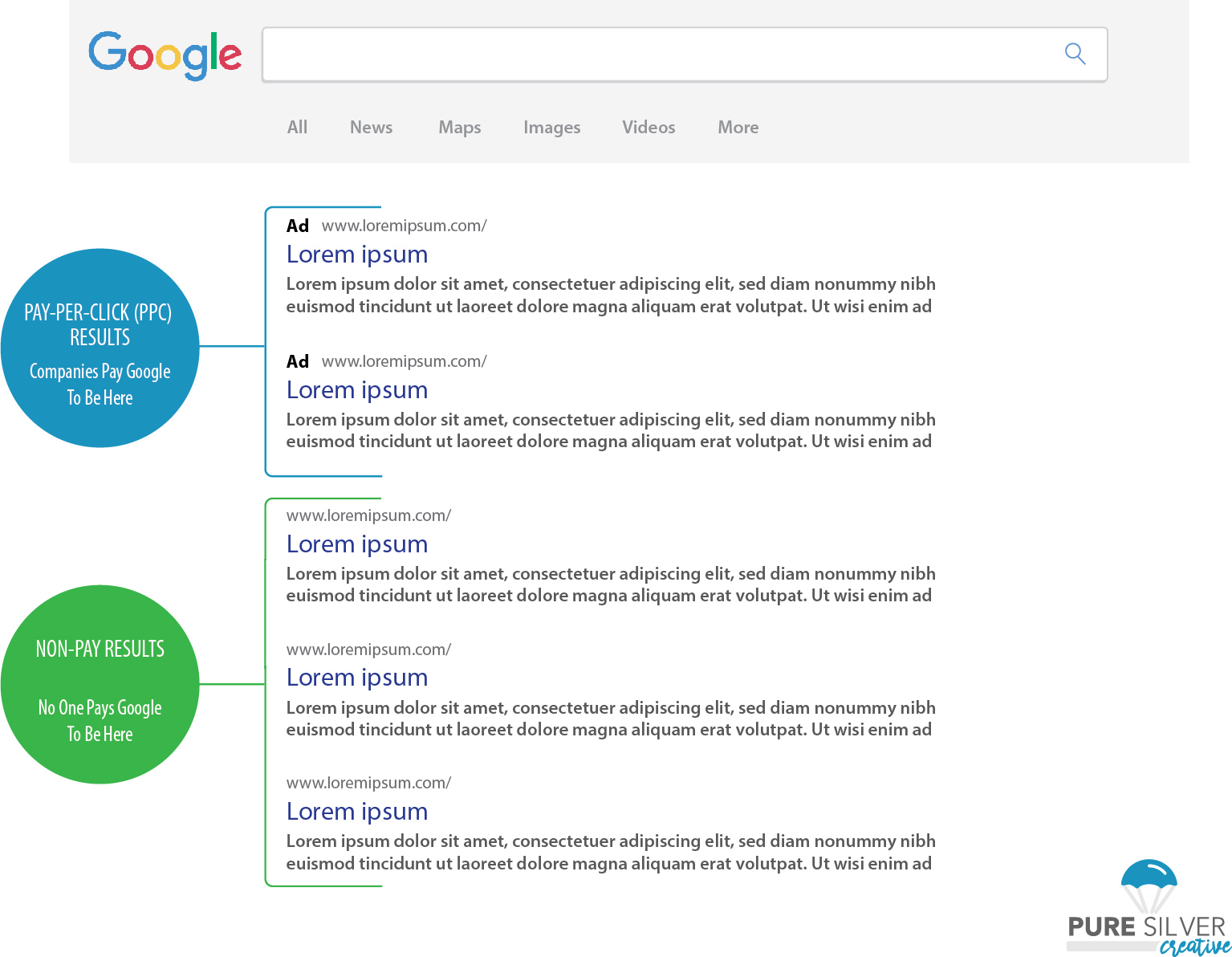Deliver more efficient, effective campaigns with Pure Silver Creative SEM services.
If you own a business, you’ve probably heard of the term Search Engine Optimization (SEO), but a lot of business owners are not familiar with the term SEM. SEM, or Search Engine Marketing, is an internet marketing tactic where marketers optimize websites to bid for ad space on search engine results pages (SERPs).
Most of the time, these two tactics are used to achieve the same goal: increase your visibility on search engine results.
But they both do it differently. While SEO relies on optimizing the content of websites to increase their ranking on various search engine algorithms, SEM relies on optimizing web pages in order to bid for paid ad space on a search engine’s first page. Most of these paid ads are bought through Google's platform called Google Ads (Google AdWords) and sometimes Microsoft's Bing ads.
Most people mistake Pay-Per-Click (PPC advertising) and SEM. While bidding on ad space through platforms like Google Ads is part of SEM, it is only one side of it. SEM includes the building of landing pages optimized for targeted keyword research and search terms as well as PPC.
Since Google ranks your landing pages according to a quality score system, SEM campaigns are usually significantly cheaper in the long term than running just PPC on its own. Indeed, if your landing pages are well built and are well correlated to search queries, your quality score will increase. The higher the quality, the fewer PPC campaigns will cost per click.

SEO VS SEM
SEO
On one hand, a website that follows SEO principles will be user friendly and will give a good image of your company to consumers. Ranking well in Google Search results will be a consequence of a well-designed website. Bringing a lot of traffic to a poorly designed website can be damaging to your company. Today, an appealing website is as important as having an appealing store. It is an investment in the long term that will make consumers more likely to purchase your products and services.
On the other hand, SEO takes time. Ranking high in search results does not happen overnight. On average, it takes between 3 to 6 months for a new website to rank on the first page depending on the keyword difficulty and competition. This delay also makes SEO less flexible and changing strategy can be difficult and take time to put in place.
SEO is not an exact science. On extremely competitive keywords, ranking at the top of the page can be almost impossible. For example, the resources it would require to be in #1 position for the keyword “travel” are out of reach of most businesses.
SEM
SEM is quick to put in place. As soon as the campaign is operational, it can start bringing your company revenue. The rapidity makes this strategy extremely adaptable. If one of our clients wants to start promoting a specific product or service, we can put in place a landing page and paid ads in less than 24 hours.
If a client wants to increase or decrease budget, it can be done instantly. Paid search also allows us to provide detailed feedback on the performance of the campaigns (clicks, impressions, click-through rate, etc.). Search Engine Management is also more affordable than most other digital marketing services. Any company, no matter how small, can compete on any keyword.
However, SEM does come with disadvantages. Unlike SEO, it requires constant spending. The day you stop spending is the day all ads will stop running. You have to pay every time someone clicks on an ad. With SEM gaining in popularity, competition is increasing, making it more expensive to bid and more difficult to compete for inexperienced marketers. In the long run, the ROI is usually not as good as SEO.
But you don't necessarily have to stack each strategy against the other. At Pure Silver Creative, we usually recommend our clients use a mix of both—targeting less competitive keywords and local search with SEO and using SEM for more difficult keywords, new products, and temporary promotions. Contact us today and we will help you determine how these two strategies can help your business generate leads and return on investment.
What is Search Engine Marketing?
Is Search Engine Marketing for You?

Why Use SEM?
- Immediate Results
- Better Leads
- Conversion Focused
- Increases Brand Awareness
- Makes more money!


